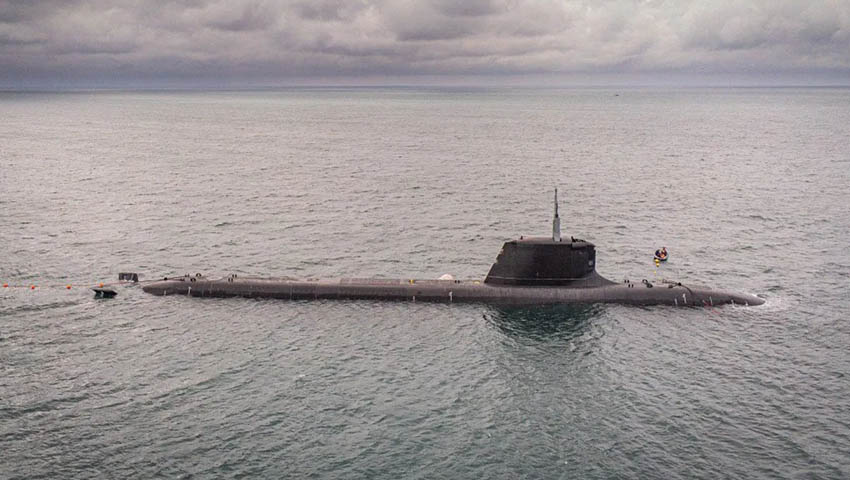The French Navy’s first-in-class, Barracuda Class nuclear-powered attack submarine (SSN) Suffren has returned to Toulon, its homeport, to begin phase three of its sea trials – with the weapons systems trials set to be the next phase.
To continue reading the rest of this article, please log in.
Create free account to get unlimited news articles and more!
Naval Group has announced that Suffren, the lead of the nuclear-powered Barracuda Class fast attack submarines (SSN), has begun sea trials with the support of the French Navy and French Defence Procurement Agency (DGA).
The sea trials will enable the DGA and the French Navy to test the performances of the submarine at sea before the delivery of Suffren to the French Navy later this year – the SSN started its sea trials with a static dive test on 28 April.
Naval Group, the French Navy and DGA have stated that the testing and trial phase will consist of three individual phases, including:
- Phase 1 took place around Cherbourg (where Naval Group’s submarine shipyard is located and where the first static diving was conducted);
- Phase 2 in Brest area, in Britanny (for deep-diving tests); and
- Phase 3 in Toulon area (in the late summer of 2020) for tests of the weapon systems. This is where the SSN will eventually be commissioned in late 2020.
Pierre Eric Pommellet, Naval Group’s chairman and CEO, welcomed the milestone for the Barracuda program, saying:
"The first sea trial of the Suffren is a source of great pride for Naval Group employees and their partners. I am extremely grateful for the efforts of our teams. They made it possible to start these trials while respecting strict compliance with the health and safety measures to protect the crew, which is partly constituted of Naval Group members.
The Suffren is the first of class, intended to replace the generation of Rubis Class SSNs. Naval Group is in charge of the production of this series of submarine – from the design to the construction of the ship – and of the information systems, the manufacturing of the main components of the nuclear reactors as Swell as the maintenance of the ships in Toulon.
The SSN Suffren sea trials are a priority for the Ministry of Defence. Naval Group deployed a series of measures for the protection of the health and safety of the employees in order to continue the operations during the COVID-19 health crisis.
The Suffren is one of the world’s stealthiest submarines. This discretion, combined with her advanced detection capabilities, guarantees her acoustic superiority.
For the first time, thanks to the Suffren Class submarines, the French Navy will have a deep strike capability with MBDA’s naval cruise missiles. The latest generation of SSNs also allows the discreet deployment of Special Forces underwater, in particular thanks to its “divers hatch” and the optional carrying of a dry deck shelter allowing for the deployment of underwater vehicles.
Naval Group's Shortfin Barracuda design, which serves as the basis for the Royal Australian Navy's new Attack Class, is a conventionally-powered variant of the nuclear-powered Barracuda fast attack submarine currently under construction for the French Navy.
The 12 vessels will be built by Naval Group at a specialist submarine shipyard at Osborne, South Australia. The Commonwealth government’s Australian Naval Infrastructure program will support the development of the future submarine shipyards.
The Commonwealth government formally signed the strategic partnering agreement with Naval Group in February 2019 ahead of confirming the final design specifications and requirements for the Attack Class submarines.
The Attack Class will enter service with the Royal Australian Navy at a time when 50 per cent of the world’s submarines will be operating in the Indo-Pacific region.
Stephen Kuper
Steve has an extensive career across government, defence industry and advocacy, having previously worked for cabinet ministers at both Federal and State levels.

 Login
Login








